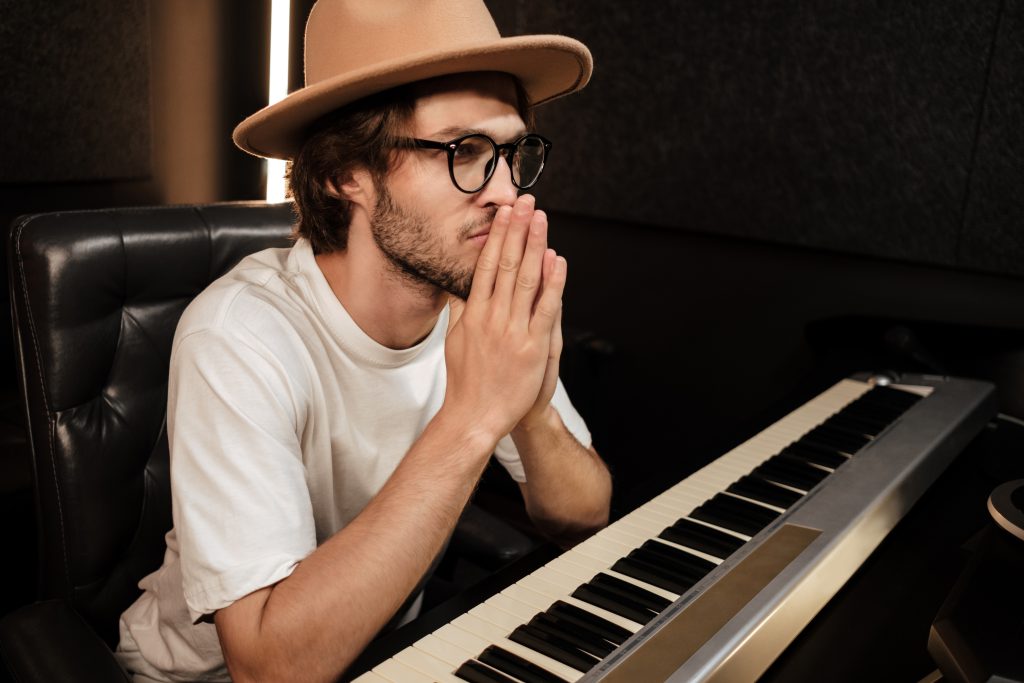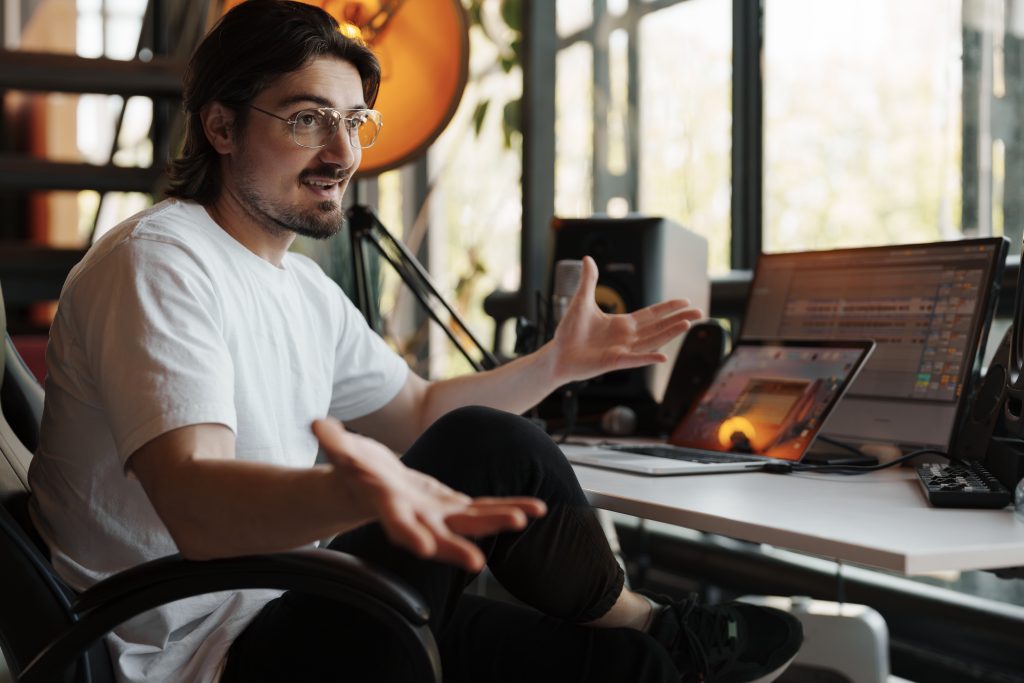Welcome to the evolving landscape of music creation, where artificial intelligence (AI) is not just a tool but a collaborator. With the rise of AI generated music, questions about ownership and copyright have become increasingly important. As a music producer, it’s important to understand these factors to use tools like Soundful’s AI Music Generator without legal issues.
In this blog post, we will look at who owns AI-generated music, what copyright means for it, and how to use Soundful’s technology in your projects while following copyright laws.
How AI Generated Music is Crafted
AI generated music refers to music created or assisted by artificial intelligence technologies. These tools analyze vast datasets of existing songs to learn patterns, styles, and musical elements. By analyzing this information, AI finds patterns in melody, harmony, rhythm, and instruments, which helps it create new music that shows these traits.
Soundful’s AI Music Generator enables users to produce high-quality musical compositions quickly and effortlessly. With our Pro Plan or higher, creators can select complete tracks or customize parts like melodies and chord progressions. This flexibility allows both new and experienced musicians to improve their workflow and projects without needing a lot of musical training.
However, the rise of AI in music production introduces significant complexities regarding copyright. As artists increasingly use AI music generators, questions of ownership and rights become crucial. Creators often wonder: who owns the music produced? Understanding the legal landscape surrounding AI-generated music is essential as it becomes a staple in the industry.
To navigate copyright implications, you need to understand how the AI trained and the specific terms of service of the tools you use. AI generated music offers exciting possibilities for creativity while prompting vital discussions about ownership and rights in this evolving landscape.
Who Owns AI Generated Music?
Several factors determine who owns AI-generated music, including the creator of the music and the training process of the AI. Here are some key points to consider:
1. Human Involvement in Creation
In traditional music production, the composer or producer typically holds the copyright for the music they create, granting them exclusive rights to reproduce and distribute their work. However, the rise of AI-generated music complicates this ownership landscape.
When using an AI Music Generator, ownership becomes less clear. If you add your creative ideas—like tweaking melodies or adjusting harmonies—you may retain copyright over the final music. The more you engage in the creative process, the stronger your claim to ownership becomes.
The U.S. Copyright Office has said that music made only by AI, without any human help, might not be protected by copyright. This highlights the importance of human involvement; by working with AI-generated music, you can improve your artistic expression and strengthen your legal rights to your creations.
In short, while AI can quickly create music, the human element is essential for ownership and artistic quality in AI-generated music.

2. AI Training Data and Copyright Issues
The training data used by an AI Music Generator plays a crucial role in determining copyright status. When an AI learns from copyrighted songs, questions arise about potential infringement, especially if the generated music closely resembles the original works. For example, if an AI track mimics a familiar melody from a popular song, it could face legal challenges.
Copyright law protects how ideas are expressed, but it can be tricky to tell the difference between inspiration and copying when it comes to AI-generated music. To avoid these issues, artists should use AI tools like Soundful’s AI Music Generator, which focuses on copyright rules by using data that has been legally obtained for training. This helps reduce the risk of infringement.
By understanding the implications of AI training data on copyright, creators can leverage AI technology while protecting their rights and those of original artists. Responsible use of AI enables artists to innovate and create high-quality music without legal worries.
3. Terms of Service and Licensing Agreements
When using an AI Music Generator, it’s crucial to thoroughly review the platform’s terms of service and licensing agreements. These documents outline the rights and responsibilities of both the user and the service provider. For example, Soundful provides clear guidelines on ownership and usage rights for the music created on its platform.
Typically, AI music platforms grant users specific rights to the music generated, enabling them to add it into their projects without legal concerns. This can include the right to modify the music, use it commercially, or share it on various platforms. However, some services might impose restrictions on commercial use, require users to credit the platform, or limit how they can distribute the generated music.
Understanding these licensing terms can help artists and producers avoid future disputes over copyright issues. For instance, if you plan to use AI-generated music in a commercial project, ensure that the licensing agreement permits such use. Staying informed about these details safeguards your creative work and maximizes the potential of your music projects.
You can check out Soundful’s Terms and Conditions here.
Navigating Copyright Aspects of AI Generated Music
As you explore the world of AI generated music, being proactive about copyright issues can help you use Soundful’s AI Music Generator effectively. Here are some strategies to consider:
1. Maintain Active Involvement in the Creative Process
To ensure you own the music created with AI, it’s important to stay actively involved in making it. While AI Music Generators like Soundful can quickly create great tracks, depending only on these tools might weaken your copyright claim. Engaging with the AI output allows you to infuse your unique style and vision into the music.
Start by using the AI-generated tracks as a foundation. Once you have a basic structure or melody, take the time to modify and enhance the output. This can involve adding your own melodies, harmonies, and rhythms that reflect your artistic identity. Experimenting with the arrangement can also make a significant difference; consider altering the song’s dynamics, structure, or instrumentation to better align with your creative goals.
Additionally, adding your personal touch not only strengthens your claim over the music but also enriches the final product. AI can provide inspiration, but your creativity and decision-making ultimately shape the music into something that represents you as an artist. By blending AI-generated music with your creativity, you create a unique sound that stands out in the industry.
2. Keep Records of Your Work
Documenting your creative process is crucial when working with AI Music, especially for establishing ownership rights. As you use AI tools like Soundful to generate music, take the time to save different versions of your compositions. This could involve creating separate files for each iteration of a track, allowing you to trace the evolution of your work over time.
In addition to saving versions, maintain detailed notes about how you modify AI-generated tracks. Record changes you make, such as altering melodies, adjusting tempos, or adding additional instrumentation. This not only helps you remember your creative decisions but also provides a clear record of your artistic contributions.
Having thorough documentation can be invaluable if questions about ownership arise. It shows that you took part in creating the music, adding your own ideas and skills to what the AI produced. As copyright laws for AI-generated content continue to change, being able to prove your involvement can help support your ownership of the music.

3. Understand the Limits of AI Generated Music
AI-generated music offers many creative opportunities, but it should be used to enhance your artistic vision rather than replace human creativity. While AI can analyze lots of music and create interesting patterns, it doesn’t have the emotional depth and personal experiences that human composers bring to their work.
AI can create catchy melodies, but it cannot replicate the unique stories or feelings that inspire musicians. To achieve impactful results, artists should blend AI-generated elements with their own creativity. This approach leverages AI’s efficiency while maintaining your distinct sound and emotional truth.
For instance, you can take an AI-generated melody and enhance it with your harmonies or change the tempo. By integrating your creative input with AI’s capabilities, you create music that resonates more deeply with listeners and stands out in a crowded market.
Experimenting with AI music generators can provide starting points for your compositions, enriching the final product with your artistic essence.
4. Stay Informed About Changes in Copyright Law
Copyright laws are constantly evolving, particularly in response to advancements in AI technologies. As AI-generated music becomes more prevalent, understanding the legal landscape surrounding it is essential for music producers and content creators. This includes tracking new regulations, court rulings, and guidelines that affect how copyright law treats AI-generated works.
For instance, the use of AI tools to create music raises important questions about ownership and the rights of both the AI developers and the users who generate music. Some jurisdictions are starting defining the legal status of AI-generated content, which can impact how copyright applies. Knowing whether the music you create with an AI Music Generator is eligible for copyright protection or if it falls into a category where others can freely copy it is crucial.
By staying informed, you can make sure your practices follow current rules, helping to avoid legal issues and protect your creative work. Check reliable sources like legal blogs and music industry news regularly to keep up with these changes.
The Future of AI Generated Music and Copyright
As AI technology progresses, its integration into music creation will become increasingly prominent. We can expect improvements in AI Music tools that will help artists and producers create high-quality music more accurately. These upgrades might include easier-to-use interfaces, smarter algorithms for making complex arrangements, and the ability to use real-time feedback from users to customize compositions better.
Simultaneously, the legal framework surrounding AI-generated music is likely to evolve. As more artists and producers use AI in their work, there will be a greater need for clear rules about copyright ownership and usage rights. Courts will create new laws to answer questions about the originality of AI-generated music and how much ownership creators can have over music made with AI help.
This changing environment highlights the need for music producers and content creators to stay updated on copyright law changes and adjust their practices. By understanding these changes, they can better protect their rights and use AI Music technology to improve their creative work.
Conclusion
AI generated music presents a new frontier in the music industry, offering unprecedented opportunities for creativity and innovation. By understanding the complexities of ownership and copyright, you can use Soundful’s AI Music Generator confidently and effectively.
Remember, the key to navigating this exciting landscape lies in active engagement with the creative process, awareness of legal considerations, and an openness to adapt as technology evolves. With the right approach, you can harness the power of AI to elevate your music projects while protecting your rights as a creator.
Ready to explore the potential of AI generated music? Dive into Soundful’s AI Music Generator today and unlock new possibilities for your musical compositions.

